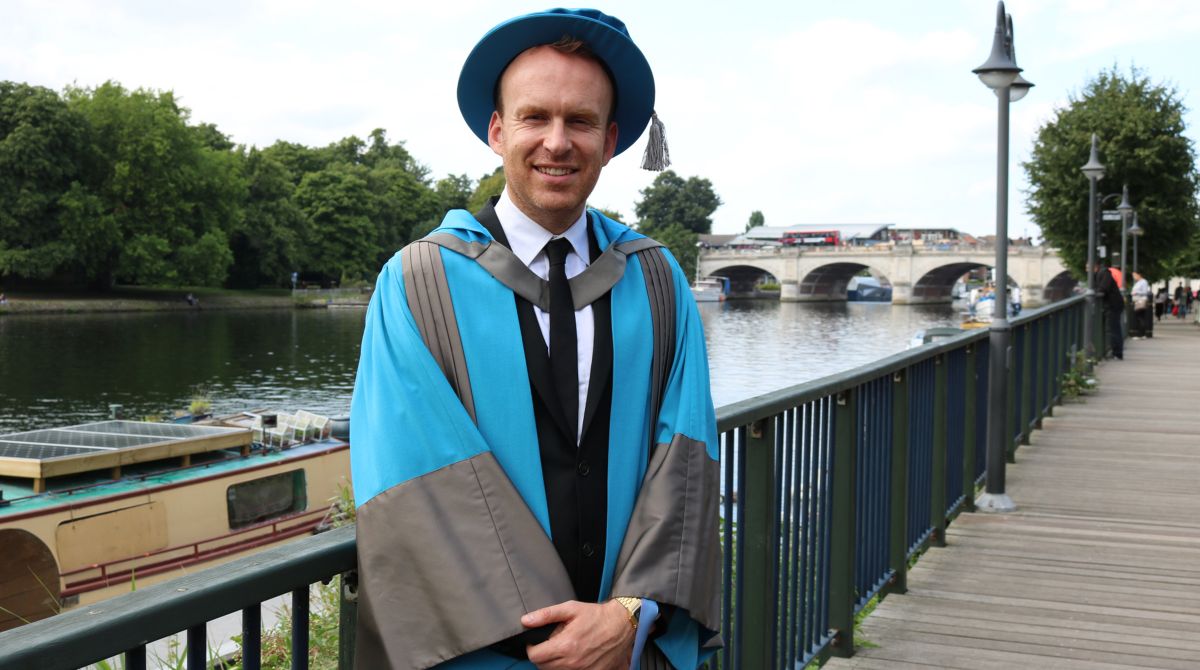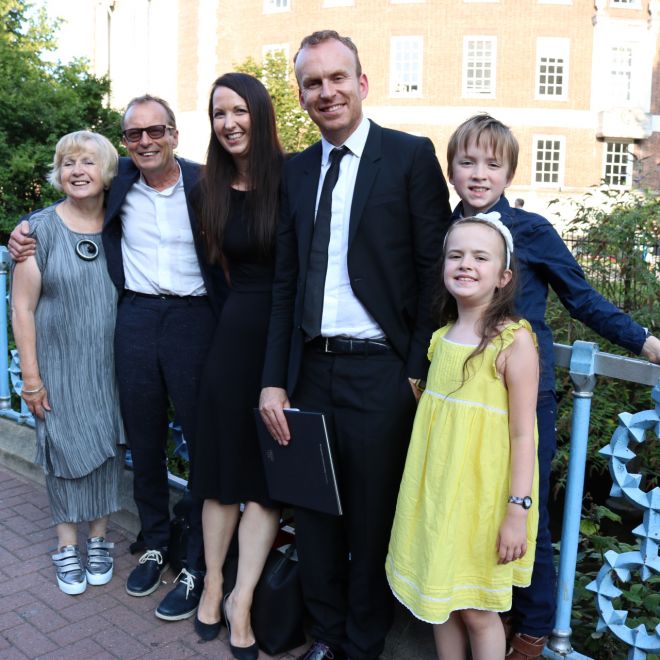Acclaimed novelist and screenwriter Matt Haig shares top tips on life after graduation as he receives honorary degree from Kingston University
Posted Wednesday 26 July 2017

Twenty years on from graduating with his first degree, best-selling author and newly-named Honorary Doctor of Arts Matt Haig has given Kingston University graduates a list of 20 essential points of advice at their graduation ceremony.
The Sunday Times bestselling author of fiction and non-fiction, screenplays and children's books stepped on to the stage at the Rose Theatre in Kingston on Tuesday to receive his award in recognition of his outstanding contribution to literature and reading pleasure.
In a speech that urged graduates to trust their own judgement, explore the world and keep doors open for further education, Haig had the audience captivated with advice he said he wished he could have told himself all those years ago.
"This is actually my first graduation ever – although I've got two degrees, I chickened out of going to my graduation ceremonies so well done on turning up for yours," he told the graduating students from the Faculty of Arts and Social Sciences.
Knowing that his parents and family would finally be able to see him graduate made the celebrations even more memorable, the award-winning author said. "I was in the middle of a tough time in my 20s and my parents never got to see the culmination of my work," he explained. "This was an amazing experience and one that my Mum can finally be impressed with."
The internationally acclaimed author has close ties with Kingston University, after his novel The Humans was selected in 2016 for Kingston University's annual Big Read, a project that sees a book sent to every new undergraduate and postgraduate student during the summer to welcome them to the University.

Haig's further advice to Kingston University graduates and particularly the aspiring writers among them was to stay focused and to not be distracted by other people's opinions. "As with any creative process, there's a lot of external noise you have to shut out – people's opinions, criticisms, ideas – but you have to stay true to yourself," he said. "No one else can read your mind and know the direction you want to take things, so centre yourself on what you want to do and take pride in it."
KU Big Read director and Associate Professor of Publishing Dr Alison Baverstock was behind Haig's Honorary Doctorate nomination and said it was an honour to present him with the award at the ceremony.
"Since his involvement with the Big Read, we've watched his career flourish with enormous pride – firstly within British publishing, and then with an international audience. It has become clear just how many people take note of what he has to say," Dr Baverstock said. "It's a real privilege to celebrate him with an honorary degree as he is so admired at Kingston University."
Matt's 20 top tips for graduates:
- Most of the things that are worrying you now will not worry you in a few years. They'll be distant ships on the horizon. Try and reduce them to that size now.
- Try very hard to do work you enjoy doing. That should be the main aim. If you enjoy something, you'll be better at doing it. Why waste your working life on something you don't enjoy? In other words, don't take that media sales job in East Croydon.
- Beware of how fast life travels. The first two decades of your life feel like forever, but your second two decades will feel like a few weeks in comparison. Appreciate that, don't rush your way through life.
- (The boring one): Look after yourself. Eat food that doesn't give you mouth ulcers, remember that crisps aren't lunch, drink soft drinks between hard drinks, don't get into pointless arguments on the internet, go for a run every now and then (your body is still going to be there in the morning and it will thank you).
- Remember that even on the busiest day, there's always time to call the people you love and tell them you love them.
- Learn to trust yourself. You'll never be able to know anyone else's mind as well as your own. When I started writing books, I was writing what I imagined other people wanted. That was totally the wrong approach – you can't be a mind reader. You have to trust yourself. If you want to write a silly story about aliens, write that story. Trust your gut and your own inner 'sat nav'. Learn to listen to it. If you get yourself right, you'll get other people right too.
- Don't let other people's doubts about you become your own doubts about you.
- Don't always head for the cool people. Head for the warm people. Kindness, laughter and love are worth a million tonnes of cool. Life is warmth – aim for warmth.
- It's more important to be yourself than to be accepted. I think this is the thing I struggled with the most. All through my 20's and into my 30's I was always agonisingly worried about what people thought of me. It truly is not a good idea wasting so much energy on worrying if you fit in, or trying to translate the frowns of strangers. That inspirational quote on Facebook was actually right – ‘it is far better to stand out as yourself than to blend in as someone else'. As Jim Carrey puts it, "Risk being seen in all your glory.
- Read more poetry. At least, read Emily Dickinson.
- Try and do some good in the world. This isn't entirely selfless – there is no drug in the universe that will make you feel as good at a deep level as being kind to other people.
- Visit new places, taste new foods, read new writers, make new friends. Explore the world but also explore your imagination – resist falling into the same, safe patterns.
- Be curious. This is how you stay young, the ultimate anti-ageing tip. Life isn't about what you know, but how much you're interested in knowing.
- Your education doesn't end today. You're going to learn a lot more after today, that's what makes life fun. Keep all the doors open.
- Stay optimistic. Optimism can be just as valid as pessimism, even more so in fact. Pessimism once told me I wouldn't live to see my 25th birthday. I'm now 42. Optimism can contain as much truth as the opposite. Hold on to whatever hope you've got and shield it like a flame.
- Don't be scared. Don't make decisions out of fear. Every wrong decision I've made over the last 20 years were the ‘sensible' ones, but being sensible is very often just a nice euphemism for being scared. One thing anxiety taught me is that when we act according to our fears, we strengthen them and then we end up trapped. Do things because you love doing them, not because they're the safest option – the safest option rarely is actually the safest option.
- There will be times when you fail. There will be bad days and there will be struggle, especially if you pursue a dream, but you need the bad days to make the good days seem good and sometimes we actually need to be knocked off track.
- Don't be afraid to be vulnerable. If you ever need help, don't be scared to ask for it. When you share your worries, you may be surprised at how supportive people can be.
- Live in the present tense. Up until this point, you have been living in the future tense – at school, you're always looking forward to the holidays or worrying about the next test or exam. Then it's pretty much the same thing at university. We're conditioned to live in the future, to work out where and who we want to be. Now though, you have a chance to finally live in the present, so don't spend every second of every day worrying about the what, who and where of the future. This is your present – learn a different lesson, learn to be in the present. The poet Emily Dickinson wrote a poem I discovered shortly after my student life, which said ‘forever is composed of nows'. Try and catch a few of them. You can spend your whole life obsessing about ghosts of the past or worrying about the future, but the corny truth is all there will ever be is what is happening here and the decisions we make in this moment.
- Most of all, don't forget to have fun. This is what we're here for – to make our own lives and other peoples' more enjoyable. Whatever journey you embark on after today, don't try and make it a straight line, take the scenic route and look around. We're given one sweet, precious life – enjoy it.
- Find out more about courses available in the Faculty of Arts and Social Sciences at Kingston University.